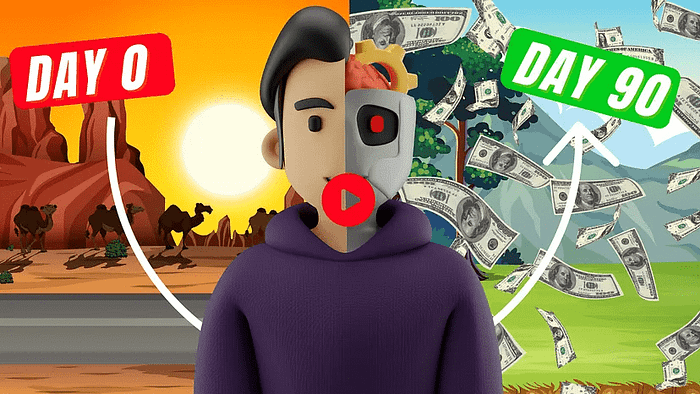How Entrepreneurs Can Build Custom AI Agents to Scale Their Business
Hello there! I’m excited to teach you how to build custom AI agents in this comprehensive guide. The world of AI is evolving rapidly, and AI agents are at the forefront of this revolution. In this article, we’ll explore the fascinating realm of custom AI agent development and how you can harness their power to create amazing solutions.
As we dive into this topic, you’ll discover why AI agents are the next big thing in technology and how you can position yourself to take advantage of this incredible opportunity. Whether you’re a seasoned programmer or a complete novice, I’ll walk you through the process of building your very first AI agent step by step.
We strongly recommend that you check out our guide on how to take advantage of AI in today’s passive income economy.
Table of Contents
The Rise of AI Agents
Google Trends and Exponential Growth
If you’ve been paying attention to the tech world, you’ve probably noticed a surge in interest surrounding AI agents. Let me paint a picture for you: imagine a graph showing search interest over time for AI agents. The line starts low, but then it begins to climb, slowly at first, but then with increasing speed. As we approach the present day, that line shoots upward, nearly vertical – that’s the exponential growth we’re seeing in AI agent interest.
This trend isn’t just a fleeting moment of curiosity. We’re on the cusp of an AI agent explosion in 2024. It’s reminiscent of the early days of the internet or the social media revolution. Most people missed out on those opportunities, but I don’t want that to happen to you with AI agents.
The Opportunity to Build Custom AI Agents
Here’s the exciting part: you have the chance to be at the forefront of this revolution. By learning to build custom AI agents now, you’re positioning yourself to ride the wave of innovation that’s about to crash onto the shores of the tech industry. Don’t worry if you’re not a programmer – I’ll show you how anyone can create these powerful tools.
Expert Insights on AI Agents
Don’t just take my word for it. Let’s consider the perspective of one of the greatest AI researchers of our generation, a co-founder of OpenAI. He believes it’s obvious that Artificial General Intelligence (AGI) will take the form of an AI agent. This insight comes from a talk he gave about eight months ago, discussing why AI agents are the path to AGI and how they provide a level playing field in the AI arena.
The Democratization of AI Development
What’s truly exciting about AI agents is that they’re democratizing the field of AI development. While large companies like OpenAI and DeepMind may have advantages in developing large language models, when it comes to building custom AI agents, individuals like you and me can reach similar levels of sophistication as those at the cutting edge. This is why learning to build custom AI agents is such an incredible opportunity.
The Impending Agent Revolution
We’re on the Cusp of Something Big
We are literally baby steps away from an explosion in AI agent popularity and capability. The agent revolution is near, and not many people truly understand the magnitude of what’s coming. This is your chance to get ahead of the curve and build custom AI agents that could change the way we interact with technology.
Missing Pieces of the AI Agent Puzzle
So, what’s holding back the full potential of AI agents? I believe there are a few key elements that, once in place, will catalyze the great unlock in AI agent technology:
- Better Language Models: The next generation of LLMs, whether it’s GPT-5, Gemini 2.0, or Claude 4+, will dramatically enhance the capabilities of AI agents.
- Cheaper API Costs: As the cost of accessing these powerful models decreases, it will become more feasible to experiment with and deploy teams of AI agents.
- Simple and Clean UI: Just as ChatGPT made interacting with AI accessible to the masses, we need intuitive interfaces for working with AI agents.
The Future is Closer Than You Think
Imagine having a team of 20+ AI agents working for you 24/7. This isn’t science fiction – it’s a future that’s rapidly approaching. By learning to build custom AI agents now, you’ll be ready to take full advantage of these advancements as they unfold.
Understanding AI Agents
Defining AI Agents
Let’s take a moment to clearly define what we mean by AI agents. These are systems designed to make decisions and take actions towards a goal. Unlike chatbots or simple language models, AI agents act on their own without needing step-by-step instructions. They can figure out the steps needed to achieve a goal you set for them.
The Concept of Agency in AI
The term “agent” comes from the Latin word “agere,” meaning “to do” or “to act.” This is crucial because it highlights the key difference between AI agents and other AI systems – agents have agency. They can take action in the world, whether that’s creating files on your computer, posting on websites, or interacting with other digital systems.
AI Agents vs. Chatbots
It’s important to distinguish AI agents from chatbots like ChatGPT. While chatbots can engage in conversation, they lack true agency. They can’t take action or do things in the real world. An AI agent, on the other hand, can interact with your computer, load websites, and perform tasks autonomously.
The GPT-5 Moment and Its Implications for AI Agents
The Brain of AI Agents
Large Language Models (LLMs) are the brains of AI agents. As these models become more intelligent, the capabilities of AI agents will expand dramatically. The release of GPT-5, for example, is expected to bring significant advancements in reasoning, long-term memory, and multimodality.
Preparing for the Next Generation of LLMs
When GPT-5 or its equivalents are released, those who know how to build custom AI agents will be in an incredibly advantageous position. The development speed in the AI agent space will be breathtaking. That’s why it’s crucial to start learning now – to be prepared for the massive leap forward that’s coming.
The First Mover Advantage
As Sam Altman, CEO of OpenAI, once said, “Once your Uber driver is talking about AI agents, it will already be too late.” This applies to every technological revolution – by the time everyone is talking about it, the biggest opportunities have often passed. Right now, you have the chance to be a first mover in the AI agent space.
The PPPPP Framework for Success with AI Agents
Proper Preparation Prevents Poor Performance
When it comes to building custom AI agents, proper preparation is key. This means doing the work now to understand the fundamentals of AI agent development. Don’t wait until the next generation of language models is released to start learning – by then, you’ll be scrambling to catch up.
Learning the Fundamentals Deeply
As Naval Ravikant, the great investor and philosopher, always says, “Learn the fundamentals deeply.” This approach is what separates successful AI agent builders from the rest. Don’t skip steps or try to jump to advanced concepts too quickly. Take the time to understand the basics thoroughly, and you’ll be better equipped to handle the complexities that come later.
Choosing Tasks for Your AI Agents
Focus on Clear, Simple Tasks
When you’re first learning to build custom AI agents, it’s important to choose the right tasks for them to perform. Current AI agents excel at automating tasks that are clear, simple, and have well-defined goals. Instead of giving your agent a vague instruction like “make me money,” focus on specific tasks like “write a detailed research paper on the latest five developments in machine learning AI.”
Start Small for Big Returns
A common mistake among beginners is trying to automate huge, complex tasks right away. Instead, focus on small, repetitive tasks you do every day. These may seem insignificant at first, but automating a task that takes just two minutes a day can save you 12 hours over the course of a year. That’s the power of building custom AI agents for everyday tasks.
Real-World Applications of AI Agents
Research and Information Gathering
Many people are using AI agents for automatic, 24/7 research. Imagine having an agent constantly scouring Reddit, Twitter, and academic archives for the latest papers and developments in your field of interest. It can summarize and simplify complex information, ensuring you stay up-to-date without being overwhelmed.
Software Engineering
Tools like GitHub Copilot are just the beginning. AI agents are being used to build, optimize, and debug code. As these agents become more sophisticated, they’ll revolutionize the way we develop software.
Customer Service
Companies like Klarna are already using AI agents for customer service, with impressive results. In fact, AI agents often receive higher satisfaction scores than human representatives. This is just one example of how building custom AI agents can transform businesses.
The Value of Learning to Build Custom AI Agents
Skill is the Real Reward
Many people assume that the finished product – the AI agent itself – is the main reward for learning this skill. But the truth is, the real value lies in knowing how to build and deploy AI agents. This skill will always be in demand as the technology evolves.
System 1 vs. System 2 Thinking in AI
Understanding the difference between System 1 (fast, intuitive) and System 2 (slow, deliberate) thinking is crucial when building custom AI agents. Current language models primarily use System 1 thinking, but AI agents are a step towards implementing System 2 thinking in AI systems, allowing for long-term planning and strategic reasoning.
Overcoming Obstacles in AI Agent Development
No Coding Experience? No Problem!
One of the biggest misconceptions about building custom AI agents is that you need to be an expert coder. While there will be some code involved, I’ve designed this course to be accessible to anyone, even those with no programming experience. With clear explanations and pre-built templates, you’ll be able to follow along and create your own AI agents.
Dealing with Errors and Setbacks
When building custom AI agents, things can go wrong – errors, bugs, and crashes are all part of the process. The key is to stay calm and not get overwhelmed. Use resources like ChatGPT to help troubleshoot issues, and remember that every problem you solve is a learning opportunity.
Starting Small and Building Up
The secret to success in building custom AI agents is to start with small projects. Even if they don’t seem particularly useful at first, these small projects are where you’ll learn the most. Take it one step at a time, gradually adding complexity and functionality as you become more comfortable with the process.
Popular AI Agent Frameworks
A Brief Overview
There are numerous frameworks available for building custom AI agents, each with its own strengths and weaknesses. Some popular options include:
- AutoGPT
- BabyAGI
- Crew AI
- Autogen
- LangChain
Choosing the Right Framework
Selecting the right framework is crucial when building custom AI agents. Consider factors like:
- Documentation quality
- Availability of tutorials
- Ease of setup and use
For this course, we’ll be using Crew AI, which I believe is an excellent framework for beginners due to its simple setup, solid documentation, and active development community.
The Future is Now
Seize the Opportunity
The AI agent revolution isn’t some distant future – it’s happening right now. Tools like GitHub Copilot are just the beginning, and thousands of brilliant minds are working on advancing AI agent technology as we speak.
Don’t Get Left Behind
I can’t stress this enough: now is the perfect time to start learning how to build custom AI agents. Don’t be one of the 99% of people who will never build a single agent and miss out on this incredible opportunity.
Conclusion
Learning to build custom AI agents is an exciting journey that can open up a world of possibilities. Whether you’re looking to automate tasks, enhance your productivity, or position yourself at the forefront of the AI revolution, the skills you’ll gain from this course will be invaluable.
Remember, the future of AI is being shaped right now, and you have the opportunity to be a part of it. So let’s roll up our sleeves and start building custom AI agents that could change the world. The next module will guide you through creating your first AI agent using Crew AI – I can’t wait to see what you’ll create!
Frequently Asked Questions About Building Custom AI Agents
How to create a custom AI agent?
Creating a custom AI agent involves several steps:
- Choose a framework: Select an AI agent framework like Crew AI, AutoGPT, or LangChain.
- Define the agent’s role and goals: Clearly outline what you want your agent to accomplish.
- Set up the environment: Install necessary libraries and set up API keys for language models.
- Design the agent’s architecture: Determine what tools and capabilities your agent needs.
- Implement the agent: Write the code to bring your agent to life, using the chosen framework.
- Test and refine: Run your agent, observe its performance, and make improvements as needed.
- Deploy: Once satisfied with its performance, deploy your custom AI agent for real-world use.
Remember, the process of building custom AI agents is iterative. Start simple and gradually add complexity as you become more comfortable with the technology.
Can I build an AI on my own?
Yes, you can build an AI on your own! With the proliferation of AI tools and frameworks, it’s more accessible than ever for individuals to create their own AI systems. Here’s why it’s possible:
- Open-source frameworks: Many powerful AI frameworks are freely available.
- Cloud computing: You can access powerful computing resources without expensive hardware.
- Pre-trained models: Leverage existing models as a starting point for your custom AI.
- Online resources: Countless tutorials, courses, and communities can guide you.
- No-code/low-code platforms: Some tools allow you to build AI with minimal coding.
While building advanced AI systems still requires specialized knowledge, creating simple AI agents or models is within reach for many individuals willing to learn and experiment.
How to make a custom AI model?
Creating a custom AI model involves these key steps:
- Define your goal: Clearly state what you want your model to accomplish.
- Collect and prepare data: Gather relevant, high-quality data for training your model.
- Choose a model architecture: Decide on the type of model (e.g., neural network, decision tree) that best fits your problem.
- Select a framework: Choose a machine learning framework like TensorFlow or PyTorch.
- Train the model: Use your prepared data to train the model, adjusting parameters as needed.
- Evaluate and refine: Test your model’s performance and make improvements.
- Deploy the model: Integrate your custom AI model into your application or system.
Remember, building custom AI models often requires a good understanding of machine learning principles and programming skills. However, with dedication and practice, it’s a skill that can be developed over time.
What are custom agents in AI?
Custom agents in AI are specialized programs designed to perform specific tasks or solve particular problems autonomously. Here’s what you need to know about them:
- Purpose-built: Custom AI agents are tailored to specific use cases or domains.
- Autonomous decision-making: They can make decisions and take actions without constant human input.
- Goal-oriented: Custom agents work towards achieving defined objectives.
- Adaptive: They can learn from experiences and improve their performance over time.
- Tool integration: Custom AI agents often incorporate various tools and APIs to enhance their capabilities.
- Personalized behavior: They can be programmed to reflect specific preferences or methodologies.
- Scalable: Custom agents can be designed to handle tasks of varying complexity.
Building custom AI agents allows you to create AI solutions that are perfectly aligned with your specific needs, whether for personal use, business applications, or research purposes. As you learn to build custom AI agents, you’ll gain the ability to automate complex tasks and create intelligent systems that can significantly enhance productivity and problem-solving capabilities.

We strongly recommend that you check out our guide on how to take advantage of AI in today’s passive income economy.




